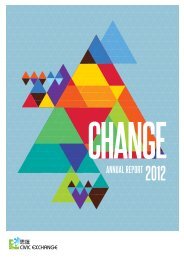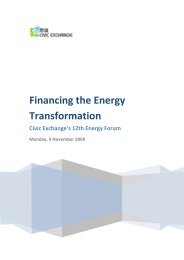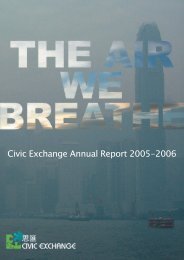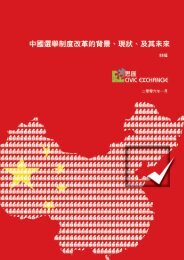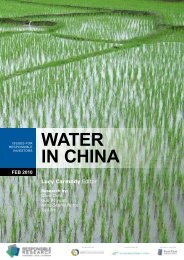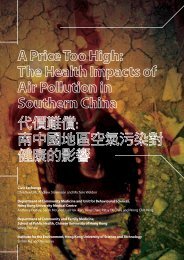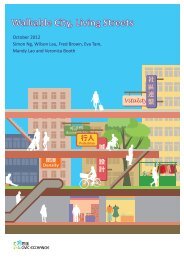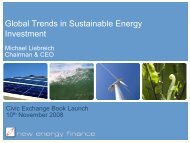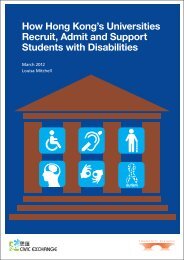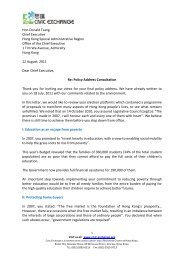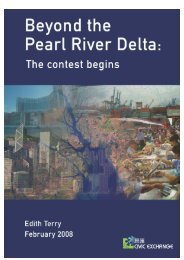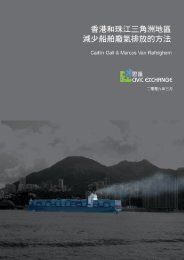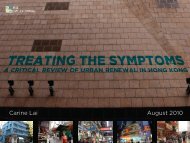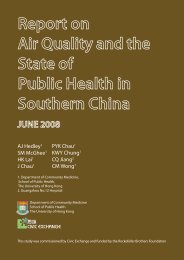Untitled - Civic Exchange
Untitled - Civic Exchange
Untitled - Civic Exchange
You also want an ePaper? Increase the reach of your titles
YUMPU automatically turns print PDFs into web optimized ePapers that Google loves.
Introduction & Summary<br />
service within the HKSAR as a whole would improve. More importantly, the external benefits associated<br />
with these changes would improve the quality of life for everyone in Hong Kong. 5<br />
Elements of a more sustainable transport system<br />
Our vision of a more sustainable transport system for Hong Kong focuses on six major elements:<br />
1. Changes in government support for different modes of mass transport, specifically in<br />
terms of government financing for passenger rail systems.<br />
The HKSAR is exceptional, and probably unique, in requiring its passenger rail systems<br />
to be largely self-financing. As a result, even though Hong Kong has the highest<br />
population density in the world, the coverage of rail network is fairly limited compared to<br />
that in other "world cities." The external benefits of replacing bus with rail service,<br />
including improvements in air quality, noise levels, and congestion, are significant.<br />
Although it is now government policy to give priority to rail development, there are no<br />
plans to change the current rail financing system or promote better bus-rail coordination.<br />
2. Re-assessment of the appropriate balance between competition and coordination among<br />
different transport modes.<br />
While competition between transport modes and a greater variety of modal choices (bus,<br />
rail, tram, taxi etc.) benefit travelers, wasteful competition may actually impose higher<br />
external costs on the community as a whole by increasing congestion and the<br />
environmental impacts of transport. Better coordination of different transport modes<br />
would improve energy efficiency and lower the external and internal costs of transport.<br />
3. Re-examination of the feasibility of tethered electric transport (electric trolley buses and<br />
modern trams) for Hong Kong, especially in highly polluted and noisy urban areas.<br />
Tethered electric transport systems should be integrated into plans for all new<br />
development areas and selectively introduced on the most polluted and noisy roads in<br />
older urban areas, with the goal of replacing most or all diesel buses. Reliance on diesel<br />
vehicles in dense urban areas is simply incompatible with attaining acceptable air quality<br />
at street level or reducing harmful levels of noise.<br />
4. Mandated use of cleaner engines and fuels in road transport vehicles.<br />
(a)<br />
(b)<br />
The Hong Kong government should encourage and assist Guangdong authorities in the<br />
development of the planned Liquefied Natural Gas (LNG) terminal. The transition to a<br />
natural gas economy throughout the Pearl River Delta is perhaps the most promising<br />
option for improving regional air quality.<br />
We also recommend that government facilitate the use of Compressed Natural Gas (CNG)<br />
in single-decker buses and medium goods vehicles and test its application in doubledecker<br />
buses and heavy goods vehicles.<br />
5<br />
Given the resources available for this project, we are unable to quantify future costs for consumers, and the impact<br />
on government expenditures/revenues with adequate precision. Nonetheless, we are confident that the overall<br />
picture outlined here is accurate, although we would welcome a detailed study on these points from government.<br />
3



